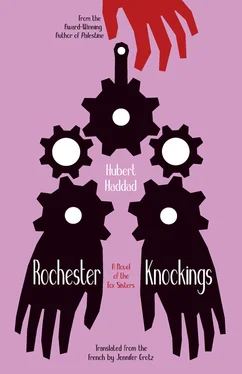Kate no longer recognized her sister. They had never discussed between themselves the perpetual virginity of Mary or the worship of the Eucharist. Even less in the participation of the unknowable being of the Trinity. The variety of vices and sins, with interior delight or conscious and voluntary transgression, had hardly been their concern up to now. Margaret returned home solemnly each night without swearing or trying to slake her thirst. Temperate and frugal, she considered all things from the point of view of grace. By nature generous, Kate provided for her happiness by offering her all the little things necessary for her asceticism. Since George’s death, she used her modest portion of the inheritance without ever counting; but no income led slowly to collapse. The lawyer’s old lessors and billers eventually objected to the widow’s debts.
When it came time to turn in the keys to the house, proof of their misfortune, Margaret sold her jewelry and some dresses to help with the costs of moving. With the twins, her sister, and two carts of furniture, Mrs. Fox-Jencken went to settle in the East End. School being mandatory only up to the age of ten, a recent age limit due to recruitment in the factories or the coal mines, she devoted herself to providing the secondary education of her sons, mixing disciplines, teaching the erroneous and the apodictic in the same way, the infestation of evil spirits and some notions of algebra. Fortunately, under the impulse of Maggie who, divided between ecstasy and sagacity, had little by little gone back to drinking, the twins were able to attend courses free of charge in a Catholic institution. At no point in their poverty, deprivation, and eventual destitution, did Kate consider the idea of going to complain to her in-laws, who associated meanness with propriety, or to reclaim her fame on a music hall stage, numerous in London, as a historical medium of quality.
When Maggie, worn out by homesickness and the uncertainty of her own vocation, took the boat back to New York, Kate found herself so distraught that she obediently began swallowing all the remains of the bottles left by her sister. This she did between visits to the immense park of Kensal Cemetery, bordering Notting Hill, where the Jencken family mausoleum, shaped like an ancient temple, stood among mourners and the statues of archangels. Facing her husband’s tomb, Kate noticed one day an old solitary tombstone, strewn with daisies, the family name indecipherable, but whose epitaph was still clear:
I’d rather hear something to make me laugh
The exclamation from the grave rang mockingly in her. Thinking of her twins, she quickly fled the cemetery and returned with a decided step to her neighborhood on the East End, between the gate and the river.
New York was smoking like a thousand locomotives under the falling snow. Mills and factories, numerous construction sites where pyramids of brick and scrap iron were being erected — with, as its emblem at the mouth of the Hudson, the immense framework of the future Statue of Liberty on its granite fortification — and likewise the mouths of the metro and the sewer, the conical or terraced roofs, and ferry boats crisscrossing the river and the strait, were all sending up fat clouds of vapor and gray-black plumes. These traveled in a rolling boil denser than a mountain fog toward the plaster casts of the sky, from which the solstice snow seemed to crumble and fall in discontinuous waves.
It was three o’clock in the afternoon on a day that had not quite fully risen and was already starting to wane when, both arms leaning against the back of a chair facing the windows — on the corner of South Street Seaport and with a view of the new Brooklyn Bridge, the dock harbors and fluvial escape toward Governors Island — Leah Underhill wondered humorlessly if her health troubles and annoyances would grant her a reprieve from the end of year festivities. At her age, one could still overcome the small warning signs of passing time, the creaky wheels of age were still oiled well, provided that one was not constantly worrying about various troubles. “They lose it that do buy it with much care,” she’d heard the other night at the Standard Theatre, at the premiere of The Merchant of Venice . And she estimated she’d inherited the bulk, and in tons, of worries, during a life devoted to the Spiritualist cause with its varied fortunes and a constant adversity from the side of barkers, hypnotists, jugglers, snake oil salesmen, and other disloyal competitors marching off in packed rows to distort the message of spirits. They were organized throughout the United States, without ever even thinking of inviting her, these conferences of mediums under big tops, in churches, and community halls. George P. Colby, somewhere in Florida, proclaimed himself prophet of Spiritualism urbi et orbi. The Anglican priest William Stainton Moses, another champion of deep trance, claimed to transcribe in shamanic dictation the living conditions in the afterlife. Emma Hardinge Britten claimed to understand in detail the works and miracles the disembodied used to answer us. And what about that half-wit Eusapia Paladino, going out with her sleeves all twisted from her perispirit, or of that stuck-up thing Frickie Wonder, who knew so well how to use her breasts and hips to captivate the old geezers of the universities while spouting the worst philosophy for girls, or still yet, to top all this bluffing off, that joker William Mac Orpheus, now one of the star attractions in the new Barnum three-ring circus! The inventory of all this deception and prevarication would have required an almanac. Baffling enough to make her lose her Latin! Leah felt much too old and betrayed to sort the wheat from the chaff. And it mattered little to her whether she was in good or bad faith, since she alone knew how to assemble the flags and drums. Modern Spiritualism was her exclusive invention, no one could contest it, and certainly not these poor rookies who had benefitted from the enterprise as apathetic and capricious associates. Like John the Baptist, she had given the impetus to a new religion with no messiah or legislator, expanded now all over the world, with crowds of proselytes more or less devoted. Thanks to her, all the dead were like Lazarus, ready to answer as present. There was no longer that plague wall between the world of the living and that of spirits. She had even contributed to the liberation of women, those slaves, white or black, by offering them a spiritual forum impregnable to most men, so stupidly full of themselves with their brute force.
But her pain was mitigated by the spectacle of the snow. Without a doubt it was the virtue of angels, this cottony and indistinct slowness that leisurely dresses the soul. But Leah still had one more demon in her head. In addition to a share of the Underhill fortune, her investments in the railroad had earned her enough to languish for several lifetimes in New York — if it occurred to God to reward her troubles — without having to give conferences on the Doctrine any more. She was abandoning without regret the emptiness of precepts and systems to the teachers of the other world. From spiritualism to spiritism, there was just one syllable missing, cheerfully replaced by the “third revelation of God.”
Leah told herself that she would have suffered it all, the lynch mob, the skeptics, the scientists incapable of admitting that there is no miracle without faith, the imposters by the dozen, and even spiritism, to top it all off, which had made off with her discovery, just as the converted persecutor Paul of Tarsus’s words were taken by a revenant named Jesus. Too old to take the offensive, she had only to look toward her retirement so long as the enemies kept their distance. But they’d been grinning at her front door ever since her sisters’ return. Without resources, always between drunkenness and madness, Margaret had displayed herself grotesquely in music halls for a few dollars, pushed by a crooked manager who had the sole ambition of denigrating her. At seventy-five years old, Leah Underhill was the only one upholding the legacy of Hydesville. And the pitiful Kate, landed back in New York this autumn with her twin warlocks, exposing a spectacle of deliquescence for all to see. . Leah had given the order to her lawyer, a good man efficient and naturally respectful of propriety, to take legal action to stop these scandals. If he could detain the one for her pattern of repeated scandal before the public, and begin the procedure to remove the children from the other for proven negligence and moral abuse, then Leah would be back on track.
Читать дальше












